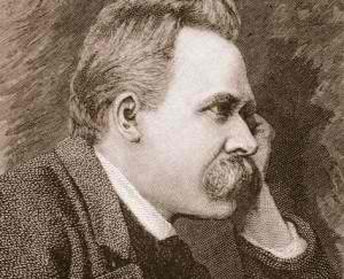I have some criticism to hand out, I’m sorry. I don’t name names(not a narc), but the way the discussion was handled around Nietzsche was too combative and angry for my taste… I like to always remember: Unity, criticism, unity
First off, let’s get one thing clear; Nietzsche was an a55hole, racist, eugenicist, misogynist and overall misanthrope. Beyond redemption, really. However, his deconstruction of Christianity, Platonism, and good/evil morality is correct. If you want to arrive to the same conclusions without the toxic reactionary bs, read eastern philosophy, read Daoism and Legalism.
With that being said, I don’t think it’s right or helpful or a positive thing to berate normal people or comrades who don’t arrive at this conclusion by themselves or are even reticent to do so. We’re firstly communists here, not philosophers. It is intellectually arrogant to assume that all of us would naturally know about Nietzsche’s horrid track record, considering that the information is not readily available/popular and there have been many decades dedicated toward the rebranding and rehabilitating of Nietzsche. Thanks to Losurdo for writing a good book to dismantle Nietzsche, but it’s 1000 pages! Dammit Losurdo, like who is actually going to read that? I would, but I’m weird.
Nietzsche, ugh, like Lemmygrad friends, comrades, let’s make sure we don’t idolize him and work to shed light on the truth of his philosophy as reactionary and bourgeois. We can yet learn from him(know yourself and know your enemy) bc there are many, many people who still idolize him. That cannot be undone by being angry but by carefully dismantling the arguments. We can only do that from a place of understanding and compassion. I for one, believe that most people are misguided or are misunderstanding Nietzsche and his project. The man did not care for being “understood.” He wrote for bourgeois elites after all. I think he’d have a lot less good-faith followers, esp from the left, if he was more openly and more often, taken down. May I suggest a superthread and prolewiki page on the subject?
Anyway, comrades, that is all. Thanks for reading. Please share questions, further reading, concerns, disagreements, corrections below.
All resources in this post are not mine. I did not do the work. Don’t thank me.
https://www.marxists.org/archive/kollonta/1923/winged-eros.htm
https://twitter.com/search?q=nietzsche (from%3Arodericday)&src=typed_query&f=top



He has a huge appeal among young males, especially lonely ones. And his use of language about “the herd” adds to that.
He definitely doesn’t offer solutions, or new systems. His usefulness is his criticism of Xtianity and morality. It’s also important to point out he wasn’t a nihilist, as often claimed. Instead, he saw the the death of god and the rise of scientism (for lack of a better word) as a massive problem that had to be addressed.
It doesn’t help that, in terms of sheer aesthetics, he’s probably one of the very greatest writers of the entire 19th century. Hegel and Marx have a fine, serviceable style, but Nietzsche is a poet. It’s very hard not to read anything from (say) “Also sprach Zarathustra” and not feel drawn to it on some level – even if consciously, you absolutely disagree with what’s being said. Freud, I find, has this same quality, where you find yourself wanting to agree with him just because the writing is so moving.
My problem with his critique is that it mostly stays on the level of the ideas of his day: i.e., 19th century German Lutheranism, and 19th century bourgeois morality. There are whole traditions of Christianity, and whole moral systems, that completely escape his purview. Even his critique of Luther is somewhat shallow, i.e., that Luther was a crafty peasant who couldn’t see the real aristocratic value of a celibate priestly class – this is in The Gay Science, if I remember correctly. And this gets to one of my big criticisms of him: that he works without much of an historical sense. He really is only sympathetic to classical antiquity, and tends to treat anything later as one big undifferentiated mass.
This is absolutely correct, and needs to be pointed out more.
Do you know, by the way, what are the main concerns of contemporary of philosophy research right now? I learned the topics you mentioned in class but after reading Marxists it seems like mainstream philosophy is a waste of time. (too scared to ask someone in person because it might be insulting)
That I can’t really answer, unfortunately, having never really been in that “world.” (My impression is that there’s a whole lot of wankery in mainstream philosophy research, but that goes for most of western academia today. And I wouldn’t for that reason necessarily discourage anybody from going into philosophy or academia – just be aware of the nonsense, and plan accordingly. You meet in most universities many fine professors who managed to fly in under the radar).
One thing I would gently insist on is the value of reading philosophers who aren’t Marxists. Why? Well for one, you actually understand Marx better when you know the philosophical tradition he sprang from. This helps you apply Marxist concepts with nuance, and avoid the twin pitfalls of liberalism and twitter ultraleftism. Second, you see that many concepts Marx advanced are not actually all that radical; they are rather reiterations of things that human beings have instinctively known for centuries. For instance, Aristotle in his Politics rather infamously defends slavery. But his defense is based on the fact that slavery was in his time a necessary part of the Greek economic system; in other words, he is starting from material reality and the forces of production. And writing in 300 BC, he was actually right – because slave society, bad as it was, represented at that time a higher mode of production, and an advance over hunter-gatherer society. People who use the Politics to defend slavery now have completely misunderstood Aristotle, because they ignore the material basis for his arguments, and the fact that the forces of production are now a thousand times more advanced than they were in ancient Greece.
(The absolutely ideal course of study that I would recommend is: Plato [Republic, Symposium], Aristotle [Physics, On the Soul], Aquinas, [first several books of the Summa Theologica], Descartes [Meditations], Kant [Critique of Pure Reason], Hegel [Philosophy of History], and then Marx’s German Ideology and The Economic and Philosophic Manuscripts of 1844. From there, proceed to Das Kapital and the rest of the Marxist canon. Of course, this takes a lot of time and is not necessarily realistically doable – the only reason I read them is for my degree path – so textbooks and summaries are your friend).
Thank you for yet another insightful response. I have read that part of Aristotle and your interpretation makes much more sense than my instructors’ handwaving. I’ve studied most of the writings in your list in lower year classes and I’ll either take a class on Hegel or study it myself. Thank you.
I agree with what you wrote about his critique of xtianity and morality. His background in philology and his knowledge of ancient greek culture had such a big influence on his thinking. His lack of historical sense is right too. He just doesn’t seem to consider it all, which is weird for someone as smart as him.
You’re right about his writing style. It definitely appealed to me at one point. Zarathustra is almost designed to attract lonely young men the way it’s written.